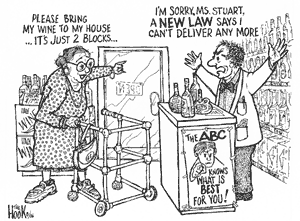NEWS- Bad taste: New law riles wineries, retailers
Before July 1, a bride buying wine for her wedding from Market Street Wineshop could have it delivered to Ash Lawn, Oak Ridge, or wherever the reception was being held. Now that's illegal.
Market Street also used to deliver to customers all over town, including to the homes of those who can't easily get downtown to the parking-challenged shop. That service, too, is now illegal.
"It's despicable," declares owner Robert Harllee.
"I have a number of elderly customers who can't get out," says Tastings owner Bill Curtis, another wine purveyor dismayed at the restrictions coming out of Richmond. It's all part of a new law designed to respond to a Supreme Court decision that quashed an older state law that seemed to favor Virginia wineries over out-of-state rivals.
Under the Farm Winery Act of 1980, Virginia wineries were able to bypass distributors and deliver their wine to customers themselves. But a federal court ruled in 2005 that self-delivery discriminated against out-of-state wineries, and the Supreme Court upheld the ruling later last year. Shenandoah Valley Delegates Chris Saxman and Steve Landes introduced a bill to allow, say, a small North Carolina winery to deliver to Virginia, but that was nipped in the bud in subcommittee. Instead, local wineries like White Hall and First Colony must now use a distributor just to move a few cases across town– much to the delight of the wine wholesale industry.
Chad Zakaib, general manager at Jefferson Vineyards and legislative committee member of the Virginia Wineries Association, calls the three-tier system (producer, distributor, and retailer), the product of "a state-mandated monopoly" that spends big bucks to buy influence in Richmond. "They just want a piece of [the wine industry] as it goes out the door," he says.
Zakaib applauds the now-illegal Farm Winery Act for helping the wine industry grow in Virginia. "It was a crack in the three-tier system, and that's the holy grail" for wholesalers, he says.
Because of the new legislation, "We've certainly lost revenue," adds Zakaib, who complains the distributor mark-up is dramatic. He says if he marks a bottle destined for the Market Street Wineshop $10, the distributor sells it for $15, and then the wineshop sells it for $20. "Without the distributor, I sell it for $12 and Robert sells it for $18. I get more money and the consumer saves," he explains.
Zakaib worries about the fate of small or new wineries who can't find a distributor to sell their product. "The state legislature mandated we use a middleman," says Zakaib, "but middlemen are not mandated to take us."
"I think that comes close to the heart of the whole colossal misperception," replies Walter Marston, a lawyer for the Virginia Wine Wholesalers. "It's demonstrably false that Virginia wholesalers are not interested in small wineries."
He cites an Alcoholic Beverage Control report that says 80 to 85 percent of the more than 1,600 out-of-state wineries that sell in Virginia shipped less than 1,000 cases. He also scoffs at claims that wine prices have gone up. "Virginia wine issues are so prone to political rhetoric they bear no resemblance to what really is going on," he says.
Marston has no sympathy for what he calls "cries of horror" and "calculated hostility" of wineries and retailers.
"It's not a secret to anybody who's paid attention," he says. The legislation "was done in a very well-attended hearing, and no one spoke against it."
However, it's possible Market Street and Tastings might be able to deliver to their customers again. "That's a statute I think could be reinstated without a lot of trouble," says Marston. "That could be fixed."
The wholesalers' lawyer also notes that the state allows wineries an inexpensive way to become distributors. That's what wine salesman and consultant Mike Woolard did. His brand-new Commonwealth Wine distributes for small, boutique wineries such as Cardinal Point, Wintergreen, and Afton Mountain.
Woolard charges a fee for delivery, and says most wineries are taking a small hit and absorbing the increase.
"It wasn't my lifelong goal to become a wholesaler," he says. "They're not considered the good guys in the industry."
First Colony general manager Kerry Hannan is "quite happy" to have Commonwealth Wine deliver, but she and her customers are still adjusting to the new ways. Before, if a restaurant or retailer asked for a delivery the same day, "We'd say, 'sure,'" says Hannan. "We used to be very accommodating. We can't do that now. And that aspect can be very frustrating because we want to build relationships with retailers."
As much as the wine wholesalers want to make nice, not all wineries are quite ready to buckle under to the three-tiered system.
"We think its a raw deal, and we have a tough time as a business anyway," says Zakaib. When the General Assembly meets again, he promises, "We're going to come out swinging."

#